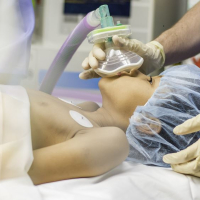
This overview of Cochrane Review of interventions for escalation of therapy for acute exacerbations of asthma in children provides the most up-to-date information to people making decisions about healthcare.
For children with acute severe asthma requiring additional treatment, the review found that:
- Intravenous magnesium sulfate (a bronchodilator given through a vein) appears to reduce the length of time spent in hospital;
- No evidence suggests that any treatment reduced the risk of being admitted to intensive care;
- Some treatments appeared to reduce the risk of hospital admission. These included adding a second type of inhaled bronchodilator treatment (anticholinergic medication such as ipratropium bromide) to standard inhaled treatment (beta-agonist such as salbutamol), giving intravenous magnesium sulfate, and breathing a mixture of helium and oxygen;
- Serious adverse events may be reduced by inhaled magnesium sulfate
- Nausea and/or vomiting is more common with aminophylline (another bronchodilator medication given through a vein)
- Adding a second type of inhaled bronchodilator treatment (anticholinergic medication such as Ipratropium bromide) reduces the risk of nausea and tremor but not vomiting.
Simon Craig, lead author and A&E doctor at Monash Health in Australia, said “acute severe asthma is relatively rare in children. The existing evidence is based on small studies, mostly from single hospitals, and with each study using different outcomes. There needs to be more trials done, and they need to be multi-centre to be large enough to detect a treatment effect. We need to use the same outcome measures across all trials to allow us to compare different treatments.” The team also recommended that a number of existing Cochrane Reviews should be updated, and we recommend that a new review be conducted on the use of high-flow nasal oxygen therapy.
For more information, read the full review.
